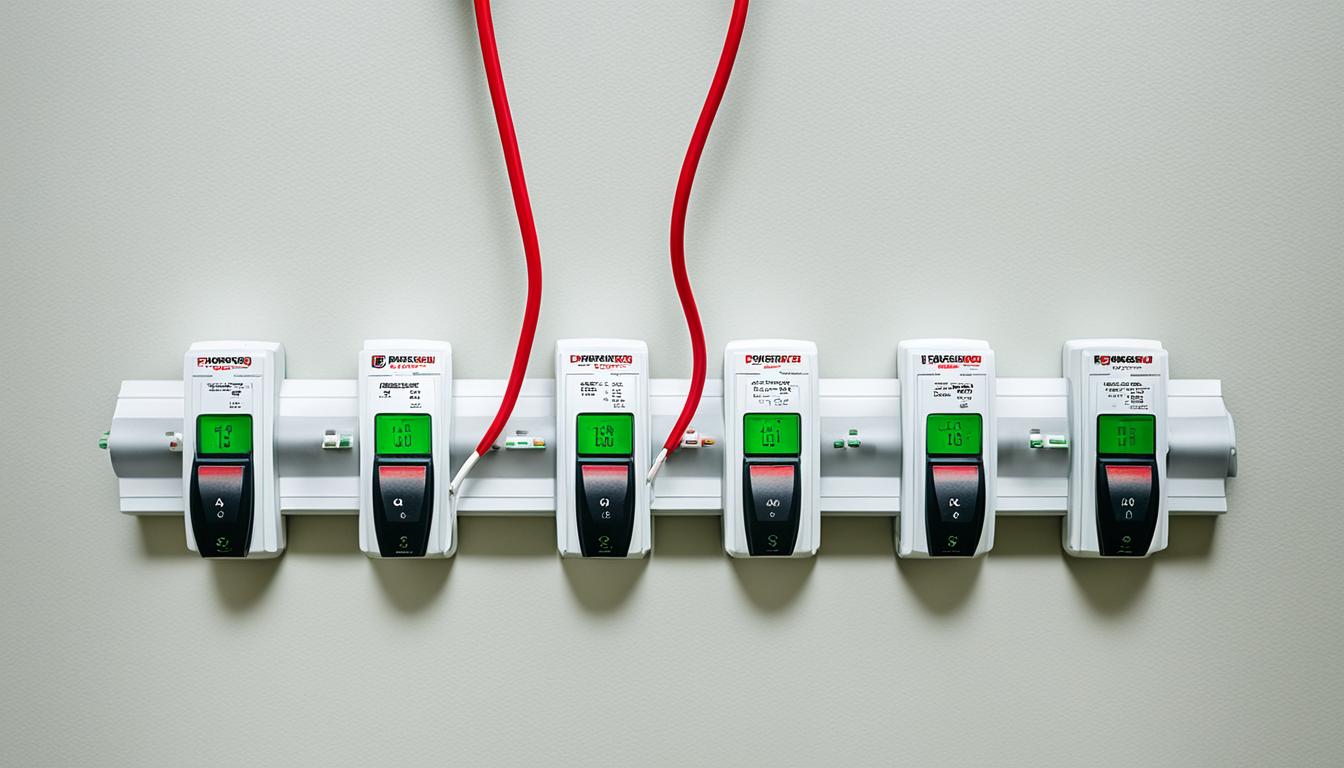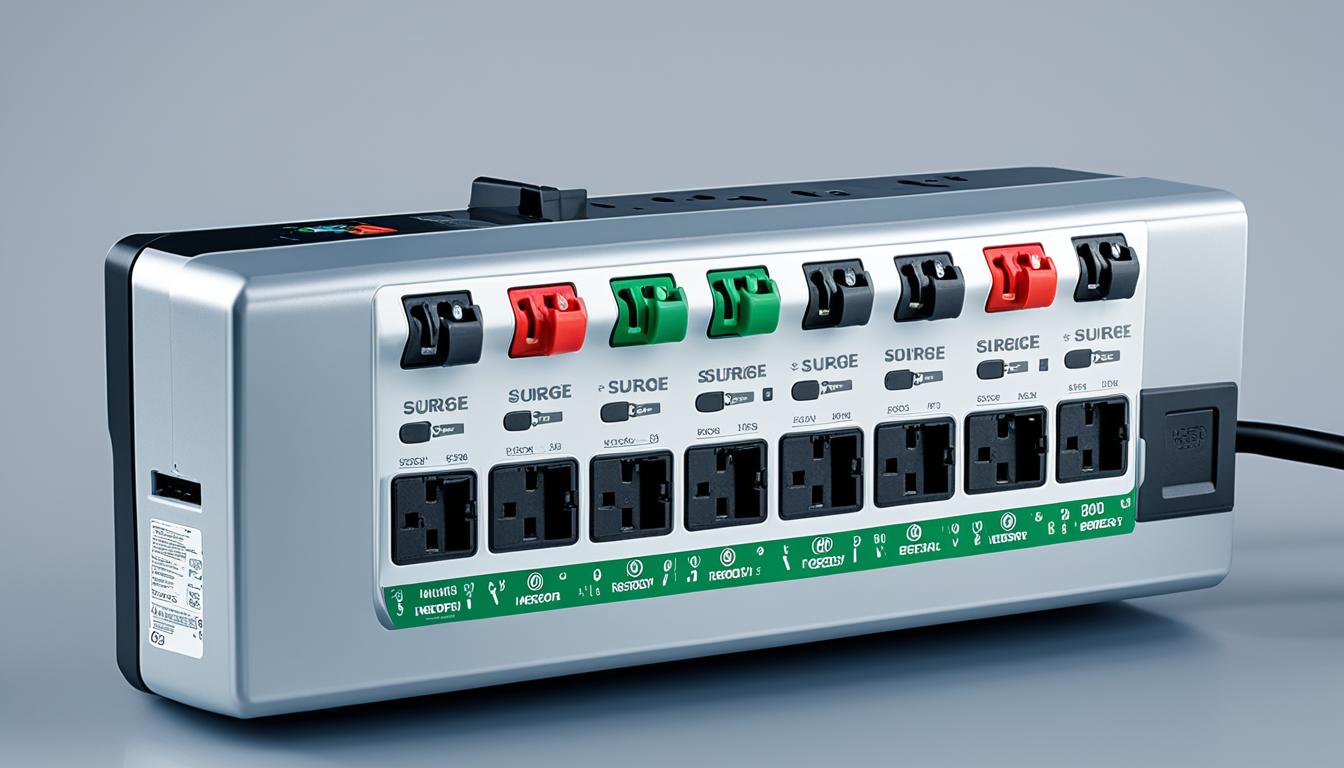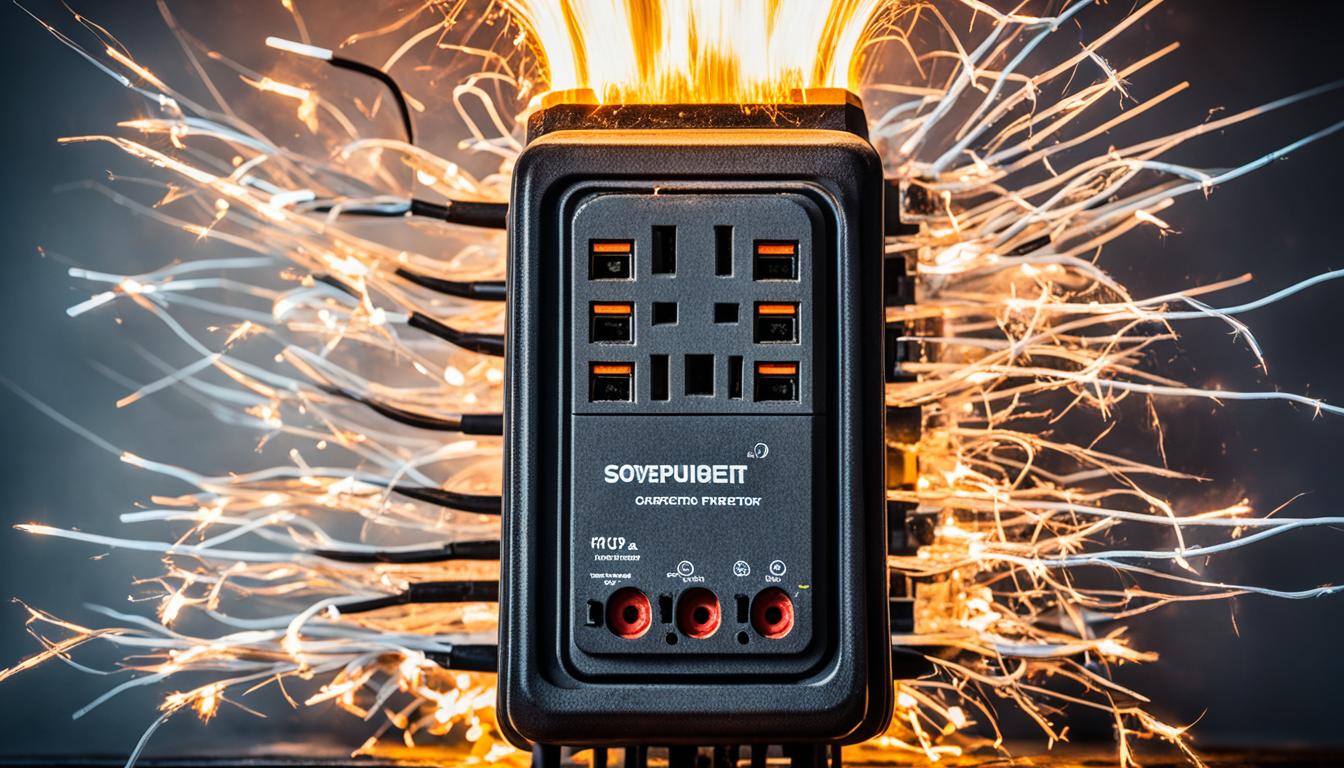When it comes to your refrigerator, safety and durability should be your top priorities. Choosing the right extension cord will ensure that your appliance is powered safely and reliably. With numerous options available in the market, it’s important to select one that suits your specific needs. In this article, we will guide you through the factors to consider, safety precautions, and provide valuable tips for connecting your refrigerator to a generator.
Key Takeaways:
- Select a heavy-duty extension cord with an appropriate gauge size of either 10 or 12 for your refrigerator.
- Ensure the cord is certified and rated by reputable organizations.
- Measure the distance between your refrigerator and the outlet to choose the correct cord length.
- Follow safety precautions, such as using polarized power strips and avoiding damaged cords.
- For mini fridges, consider using a medium-duty power strip or extension cord with a gauge size of either 14 or 16.
Factors to Consider when Choosing an Extension Cord for a Refrigerator
When selecting an extension cord for your refrigerator, there are certain factors to consider. First, determine the power requirements of your appliance and then choose a cord with the appropriate gauge.
For refrigerators, it is recommended to use heavy-duty cords with a gauge size of either 10 or 12. These cords are designed to handle the higher power demands of refrigerators and provide a safe and reliable power supply.
Additionally, ensure that the cord is certified and rated by reputable organizations such as UL (Underwriters Laboratories). This certification ensures that the cord meets the necessary safety standards and has undergone rigorous testing for durability and performance.
It is also important to measure the distance between your refrigerator and the outlet to select an appropriate cord length. Using a cord that is too short may require the refrigerator to be placed in inconvenient locations or may cause strain on the cord. On the other hand, using a cord that is too long can create excess slack, posing a tripping hazard or increasing the risk of cord damage.
Key Factors to Consider:
- Power requirements of the refrigerator
- Gauge size of the cord (10 or 12)
- Certification and rating (UL certification)
- Cord length to fit the distance between the refrigerator and the outlet
“Choosing the right extension cord for your refrigerator is essential for ensuring safe and reliable power supply. Consider the power requirements, gauge size, certification, and cord length to make an informed decision.”
Safety Precautions for Using an Extension Cord with a Refrigerator
When using an extension cord with your refrigerator, it’s important to prioritize safety to avoid potential hazards. By following these safety precautions, you can ensure the reliable and secure operation of your refrigerator.
-
Use certified extension cords: Always use extension cords that are certified and have proven ratings to guarantee their safety. Look for cords that are tested and approved by reputable organizations such as UL (Underwriters Laboratories) to ensure they meet industry safety standards.
-
Choose polarized power strips or cords: Opt for power strips or cords with three-prong plugs, also known as polarized plugs. These plugs have one prong wider than the other, reducing the risk of harm in case of power surges or electrical faults.
-
Disconnect properly: When disconnecting the extension cord from the wall outlet, always pull it gently from the plug itself and not the cord. Pulling from the wire can damage the cord and lead to safety hazards.
-
Monitor cord temperature: Regularly check the temperature of the extension cord while in use. If you notice that the cord feels hot to the touch, immediately disconnect it from the refrigerator and investigate the issue. An overheating cord could indicate an electrical problem that requires attention.
-
Avoid damaged power strips: Do not use a power strip if its wire is damaged or frayed. Damaged cords can increase the risk of electrical shocks or fires. Inspect the power strip regularly for any signs of wear or damage, and replace it if necessary.
Following these safety precautions will help you maintain the safety and reliability of your refrigerator when using an extension cord.
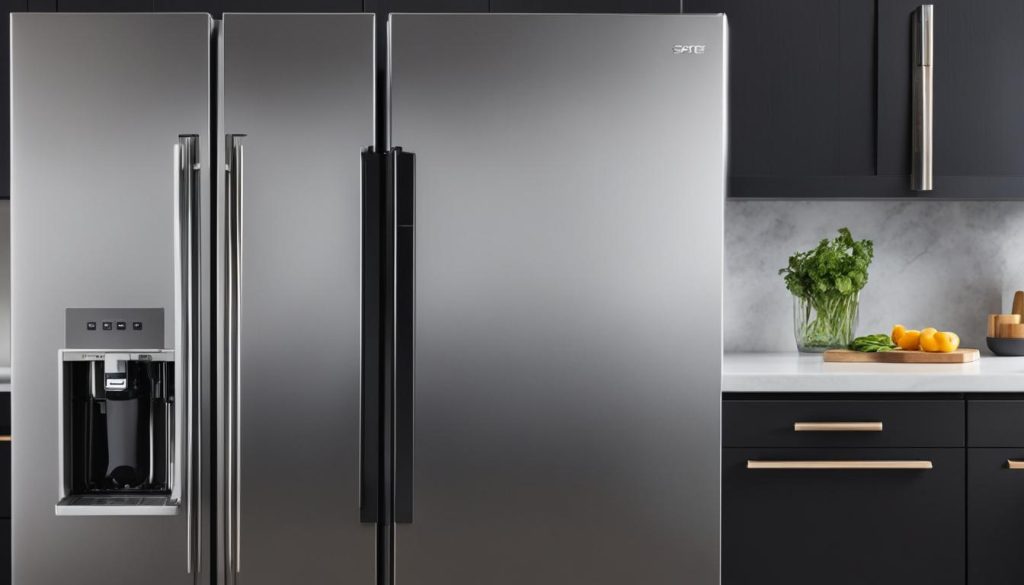
Using an Extension Cord with a Mini Fridge
Mini fridges are compact appliances with lower power requirements compared to larger refrigerators. If you need to extend the reach of your mini fridge’s power cord, you can use a medium-duty power strip or extension cord. Refine your search for the perfect extension cord by considering the following:
Gauge Size
The gauge size of an extension cord is indicative of its wire thickness and capacity to carry electrical current. For a mini fridge, it is generally safe to use an extension cord with a gauge size of either 14 or 16. It is important, however, to avoid using a cord with a gauge lower than 16 to prevent overloads and potential fire hazards.
Amperage
Before selecting an extension cord, check the amperage of your mini fridge. This information can usually be found on the appliance’s label or in the user manual. Knowing the amperage will help you determine whether the extension cord can safely handle the power requirements of your mini fridge.
When connecting your mini fridge to an extension cord, it is crucial to avoid plugging in other high-power appliances into the same power strip. Overloading the cord with multiple high-power devices can lead to overheating and pose safety risks.
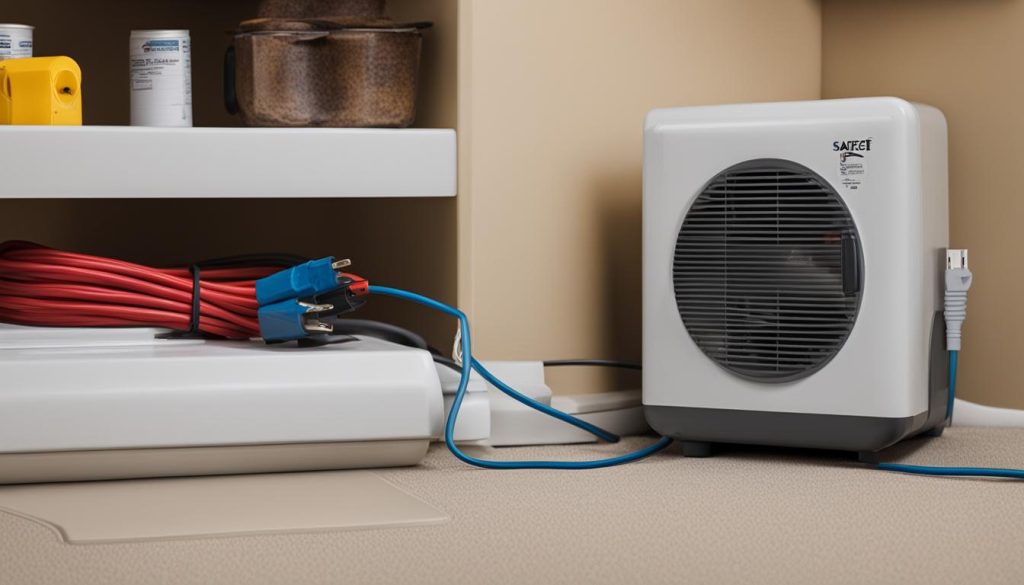
Connecting Multiple Appliances with an Extension Cord
When it comes to using extension cords, it’s important to understand how to connect multiple appliances safely. Specifically, connecting a microwave and a refrigerator to the same extension cord is not recommended. Doing so can strain the cord and lead to increased wear and tear on both the cord and the connected devices.
Your power cord for the refrigerator is designed to handle the specific power requirements of your appliance. Mixing high-power appliances, such as a microwave, with a refrigerator on the same extension cord can result in power overloads, which may cause the cord to become overheated and potentially create a fire hazard. To ensure the safety and proper functioning of your appliances, it is best to use separate extension cords for each device.
If you need to plug in multiple appliances in the same area, consider using a power strip with built-in surge protection. This will allow you to connect multiple devices to a single outlet while minimizing the strain on individual extension cords.
Remember, safety should always be a top priority when it comes to using extension cords with multiple appliances. By using separate extension cords and distributing the power load appropriately, you can avoid potential hazards and ensure your appliances operate smoothly.
Connecting a Refrigerator to a Generator
When it comes to connecting your refrigerator to a generator during power outages, it’s important to ensure a safe and efficient operation. By following a few steps, you can keep your food fresh and minimize the risk of electrical damage.
First, check the wattage requirements of your refrigerator. This information can usually be found in the owner’s manual or on the back of the appliance. Make a note of the wattage value as it will determine the minimum capacity your generator must have.
Next, verify that the maximum wattage output of your generator exceeds the wattage requirements of your refrigerator. This will prevent overloading and ensure a stable power supply. If your generator falls short, it may result in damage to both the generator and the refrigerator.
In order to connect your refrigerator to the generator, use an appropriate extension cord designed for refrigerator use. An extension cord specifically made for refrigerators will be heavy-duty and capable of handling the power load. This will help maintain a steady and safe power supply to your appliance.
Ensure that the extension cord is securely plugged into the generator and the refrigerator. Double-check the connections to avoid any loose or faulty wiring that could cause disruptions or potential hazards.
It’s also important to keep the generator at a safe distance from your home, following the manufacturer’s instructions. This will prevent any carbon monoxide buildup and ensure the safety of your household.
Once you have completed the connection, start the generator and allow it to stabilize. This will ensure a consistent power flow to your refrigerator and prevent any potential damage that may occur during the startup process.
Note: Always consult your specific generator and refrigerator manuals for detailed instructions and safety guidelines.
Remember, a reliable generator and a properly connected extension cord are essential to keeping your refrigerator running smoothly during power outages. By taking the necessary precautions, you can confidently navigate temporary electrical disruptions while keeping your food fresh and safe.
Recommended Extension Cord Specifications for Connecting a Refrigerator to a Generator
| Extension Cord Gauge Size | Recommended Usage | Maximum Length |
|---|---|---|
| 14 | Medium-duty use for mini fridges or low-power refrigerators with wattage requirements up to 1,200 watts | 50 feet |
| 12 | Medium to heavy-duty use for standard refrigerators with wattage requirements up to 1,800 watts | 75 feet |
| 10 | Heavy-duty use for larger refrigerators with wattage requirements up to 2,500 watts | 100 feet |
Understanding Power Ratings of Extension Cords
To ensure the safe and efficient functioning of your refrigerator, it is crucial to understand the power ratings of extension cords. Familiarize yourself with terms like watts, amps, and volts to make an informed decision. Watts measure the electrical power of a device, amps indicate the current generated by conductors, and volts define the electric potential.
Understanding these values allows you to calculate the power rating of an extension cord using the formula: Watts = Amps x Volts. By knowing the power requirements of your refrigerator, you can select an extension cord that can handle the load and prevent overloads and short circuits.
When choosing a refrigerator electrical cord or refrigerator power cord, ensure that the cord you select is rated to meet the power demands of your appliance. Using an under-rated cord can result in overheating and damage. Always check the power requirements of your refrigerator and choose a cord that matches or exceeds those specifications.
FAQ
What should I consider when choosing an extension cord for my refrigerator?
When selecting an extension cord for your refrigerator, consider the power requirements of your appliance and choose a cord with the appropriate gauge size. It is recommended to use heavy-duty cords with a gauge size of either 10 or 12. Additionally, ensure that the cord is certified and rated by reputable organizations such as UL. Measure the distance between your refrigerator and the outlet to select an appropriate cord length.
What safety precautions should I follow when using an extension cord with a refrigerator?
Only use extension cords with proven certifications and ratings. Choose polarized power strips or cords with three-prong plugs to reduce the risk of harm in case of power surges. Always pull the cord from the plug and not the wire when disconnecting it from the wall outlet. If the cord feels hot, immediately disconnect it from the refrigerator. Avoid using a power strip if its wire is damaged.
Can I use an extension cord with a mini fridge?
Yes, you can use a medium-duty power strip or extension cord with a gauge size of either 14 or 16 for a mini fridge. However, ensure that the cord used is not lower than a 16-gauge to prevent overloads. Check the amperage of the mini fridge and avoid plugging in other high-power appliances into the same power strip.
Is it safe to plug a microwave and a refrigerator into the same extension cord?
It is not recommended to plug a microwave and a refrigerator into the same extension cord. Running these two appliances together can strain the cord and increase wear and tear on both the cord and the connected devices. To ensure safety and proper functioning, use separate extension cords for each appliance.
Can I connect a refrigerator to a generator?
Yes, you can connect a refrigerator to a generator as long as the generator’s capacity meets the power requirements of the appliance. Check the wattage requirements of the refrigerator and ensure that the generator’s maximum wattage exceeds that demand. Follow proper steps, such as keeping the generator at a safe distance from the house and starting the refrigerator after connecting it to the generator.
How do I understand the power rating of an extension cord?
To understand the power rating of an extension cord, be familiar with terms such as watts, amps, and volts. Watts measure the electrical power of a device, amps measure the current generated by conductors, and volts define the electric potential. By knowing the values of amps and volts, the power rating of an extension cord can be calculated using the formula: Watts = Amps x Volts. It is crucial to select a cord that can handle the power requirements of the refrigerator to prevent overloads and short circuits.
